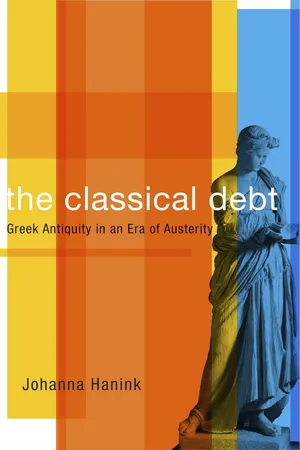
- English
- ePUB (mobile friendly)
- Available on iOS & Android
About this book
Ever since the International Monetary Fund's first bailout of Greece's sinking economy in 2010, the phrase "Greek debt" has meant one thing to the country's creditors. But for millions who claim to prize culture over capital, it means something quite different: the symbolic debt that Western civilization owes to Greece for furnishing its principles of democracy, philosophy, mathematics, and fine art. Where did this other idea of Greek debt come from, Johanna Hanink asks, and why does it remain so compelling today?
The Classical Debt investigates our abiding desire to view Greece through the lens of the ancient past. Though classical Athens was in reality a slave-owning imperial power, the city-state of Socrates and Pericles is still widely seen as a utopia of wisdom, justice, and beauty—an idealization that the ancient Athenians themselves assiduously cultivated. Greece's allure as a travel destination dates back centuries, and Hanink examines many historical accounts that express disappointment with a Greek people who fail to live up to modern fantasies of the ancient past. More than any other movement, the spread of European philhellenism in the eighteenth and nineteenth centuries carved idealized conceptions of Greece in marble, reinforcing the Western habit of comparing the Greece that is with the Greece that once was.
Today, as the European Union teeters and neighboring nations are convulsed by political unrest and civil war, Greece finds itself burdened by economic hardship and an unprecedented refugee crisis. Our idealized image of ancient Greece dangerously shapes how we view these contemporary European problems.
Frequently asked questions
- Essential is ideal for learners and professionals who enjoy exploring a wide range of subjects. Access the Essential Library with 800,000+ trusted titles and best-sellers across business, personal growth, and the humanities. Includes unlimited reading time and Standard Read Aloud voice.
- Complete: Perfect for advanced learners and researchers needing full, unrestricted access. Unlock 1.4M+ books across hundreds of subjects, including academic and specialized titles. The Complete Plan also includes advanced features like Premium Read Aloud and Research Assistant.
Please note we cannot support devices running on iOS 13 and Android 7 or earlier. Learn more about using the app.
Information
INDEX
- Abbasid caliphate, 72–73
- Abductions of women, clashes between Greeks and “barbarians” and, 45
- Academy of Athens, 155, 157
- Acropolis, 75; curtain wall on, 42; Delian League treasury moved to, 50; demolition and purification of, 158–159, 160–161; first rebuilding of, 40; integrated architectural concept and, 61; Lusieri’s acquisition of antiquities from, 134–135; Nazi flag raised over, 177; Pittakis and archeological work at, 166; Plutarch on ageless soul of, 78; Propylaea and framing of view toward Salamis, 42–43, 62, 251; 2004 Summer Olympics and makeover competition for, 189–190; Venetian siege of, 86, 87, 88. See also Erechtheion; Parthenon; Propylaea
- Acropolis Sound and Light Show, 180–182, 207
- Adventures of the Acropolis Marbled Girls (Hadjoudi-Tounta), 160
- Aeneid (Virgil), 33–34
- Aeschylus, 47, 48, 49, 56, 60, 67, 142, 183, 252
- Afrocentrism, 18
- Age of Discovery, 71
- Agora (Athenian), excavations at, 262
- Alcmaeonids family (Athens), 53
- Aldus Manutius, 73
- Alexander I (Tsar of Russia), 139, 140
- Alexander the Great, 25, 26, 36, 55, 60, 66, 68, 111, 186, 230
- Ali Pasha (“Lion of Ioannina”), 140
- al-Qaeda, 13
- Amalia (queen of Greece), 162
- American Revolution, 119
- American School of Classical Studies (Athens), 179, 262, 263
- Amphipolis, new archeological find at, 229–230, 231
- Ancient History (Rollin), 119–120
- Anderson, Benjamin, 101
- Andronikos, Manolis, alleged royal tombs at Vergina and, 185, 186, 229, 231
- And the Weak Suffer What They Must? (Varoufakis), 238
- Angelos, James, 209, 221, 227, 228
- Antigone (Sophocles), 23, 56, 244
- Antiquities: black market for, 261; German occupation and theft of, 178; Greek independence and new significance of, 152; Greek Right’s appropriation of, 255; museums, networks of looters and brokers, and, 261; nationalizing of, during War of Independence, 153; ownership and, question of, 255–264; in service of nation b...
Table of contents
- Cover
- Title Page
- Copyright
- Dedication
- Contents
- Preface
- One: Champions of the West
- Two: How Athens Built Its Brand
- Three: Colonizers of an Antique Land
- Four: From State of Mind to Nation-State
- Five: Greek Miracle 2.0
- Six: Classical Debt in Crisis
- Seven: We Are All Greeks?
- Epilogue: A Note for Educators
- Notes
- Further Reading
- Illustration Credits
- Index